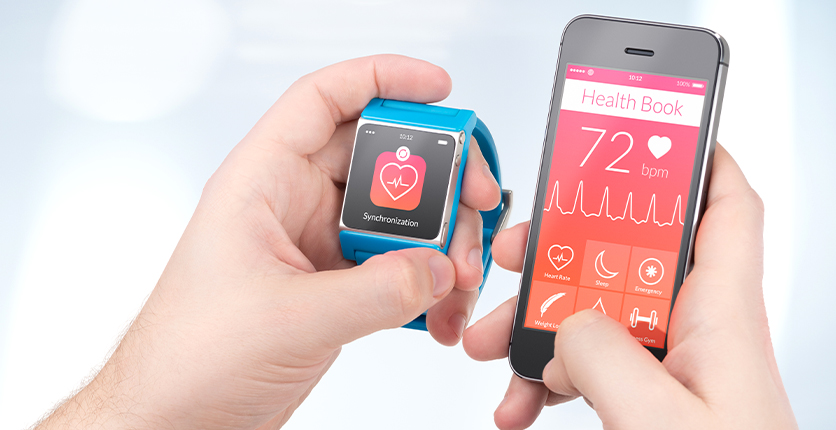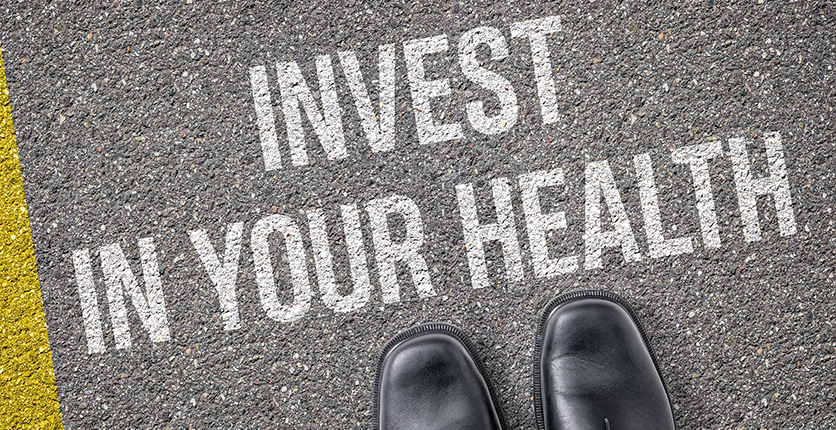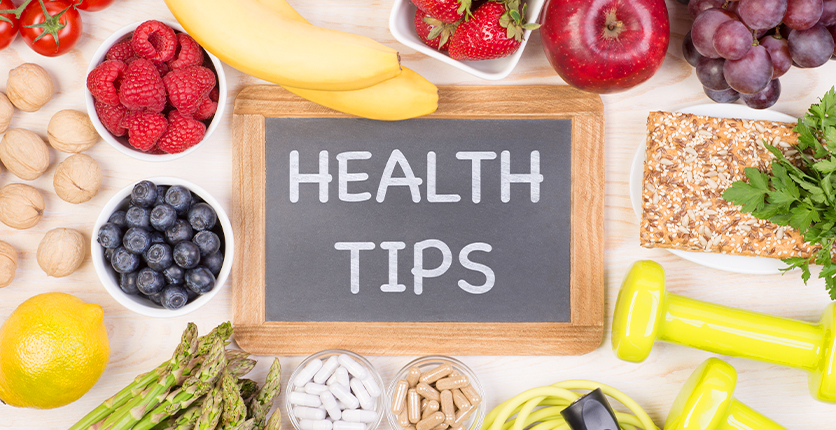Our personal health and financial health are more connected to each other than you may think. We’ve all heard the saying that “health is wealth”, and this is, quite literally, true. People who are physically and mentally healthy tend to do better at work and have a higher earning power. When you’re healthy, you also avoid having to pay costly medical bills and hospital expenses.
It therefore pays to invest in your health. While you don’t have to be wealthy in order to be healthy, it’s worth spending money on things that will help you develop healthier habits, nourish your body and mind, help you maintain your strength and fitness, and make it easier to get the care you need in case of emergencies.
1. Eat good-quality whole foods

The healthier your diet, the more energy you’ll have and the lower your risk of developing chronic illnesses such as cardiovascular disease, diabetes and certain cancers. Being properly nourished also means being able to think more clearly at work and get more done.
Tiffany Wee, a naturopath and functional medicine practitioner from Mind Body Shine says that a nutritious diet should consist of the following: Fruits and vegetables, which are high in vitamins, minerals and fibre; protein, in the form of lean meat, poultry and beans for muscle repair and growth; whole grains like brown rice and oats, which are packed with fibre; and healthy fats, found in oily fish, olive oil, avocado, nuts and seeds.
Make sure your diet is made up mostly of these whole foods. They may cost a little more than processed or refined foods, but they’re more nutrient-dense, especially when prepared in wholesome ways (for instance, steaming or sauteing as opposed to deep-frying).
Organic produce is also slightly more expensive than conventionally grown produce, but they’re worth the money if you can afford it as they’re grown without synthetic pesticides and fertilisers and are thus better for your health, Tiffany adds.
2. Supplement your diet to prevent deficiencies

Men aged in their 20s to 40s – especially those who are constantly on-the-go and have dietary gaps – may want to consider taking vitamin and mineral supplements to help prevent nutritional deficiencies.
Here’s what Tiffany recommends:
- Vitamin D: Living on the equator means that most of us have sufficient sun exposure (which triggers vitamin C production in the body), however, many people still may not get enough vitamin D, especially if they have indoor lifestyles or wear sunscreen regularly. Supplementing with vitamin D can support bone health, immune function and overall wellbeing.
- Vitamin B12: It’s not uncommon for vegetarians and vegans to be deficient in vitamin B12. This vitamin is primarily found in animal products and is essential for nerve function, red blood cell production and energy metabolism.
- Omega-3 fatty acids: While oily fish like salmon is part of the Singaporean diet, omega-3 supplementation can be beneficial for heart health, brain function and reducing inflammation, especially if fish consumption is inconsistent.
- Zinc: Zinc supports immune function, wound healing and protein synthesis. It’s also important for maintaining a sense of taste and smell. Adequate zinc intake can sometimes be challenging, especially for vegetarians and vegans.
- Magnesium: Magnesium is involved in numerous biochemical reactions in the body, including muscle and nerve function, energy production and bone health. It may be beneficial to supplement if your dietary intake is inadequate, which is sometimes the case despite Singapore’s diverse food options.
- Probiotics: Supporting gut health with probiotics can be useful, especially if you have digestive issues or are prone to stress. Probiotics help maintain a healthy balance of gut bacteria, which is important for immune function and overall wellbeing.
“When choosing supplements, it’s crucial to consider your individual dietary habits, health status and specific needs,” Tiffany adds.
“Speak to your healthcare provider to determine if you have deficiencies or if supplements are necessary. They can provide personalised recommendations based on your lifestyle and health goals.”
Find out more about the types of supplements, what they do for you and if you need to take them.
3. Choose a good mattress for the best night’s sleep

“Getting quality sleep every night is essential to maintaining overall health and optimising your physical, mental, and emotional wellbeing,” says Tiffany.
Creating a conducive sleep environment starts with investing in a well-made and supportive mattress.
Here’s what to look for, Tiffany points out.
- Support: The mattress should provide adequate support, especially for your spine. It should keep your spine aligned in a neutral position, whether you sleep on your back, side or stomach.
- Comfort: Choose a mattress that feels comfortable to you. This is subjective and varies based on personal preference (for example, firmness level).
- Materials: Select high-quality materials that are durable and provide good ventilation to regulate temperature during sleep. Common materials include memory foam, latex and innerspring coils.
- Motion isolation: If you sleep with a partner, consider a mattress that minimises motion transfer. This prevents disturbances when one person moves during the night.
4. Protect yourself with health insurance

You may not think you need health insurance, especially when you’re young, but unexpected medical conditions can occur and affect us at any age, says Susan Ong, General Manager, Corporate Business, Income Insurance.
“Having an adequate insurance portfolio can help provide financial support during medical emergencies, critical illnesses or other unfortunate circumstances — which can result in large, and often unexpected, expenses,” she explains.
Having insurance protection means not having to dip into your savings for health emergencies. This gives you peace of mind, allowing you to focus on treatment and recovery. Furthermore, if you are unable to earn an income during recovery or are left permanently disabled after an illness or accident, having an insurance plan in place can help alleviate financial burdens.
The best time to purchase health insurance is when you’re young and healthy and typically have fewer health issues than older adults, which would allow you to enjoy the maximum coverage.
“If you only get insurance after developing a health condition, you may have to pay higher premiums or risk getting your medical condition excluded altogether,” Susan adds.
“Purchasing health insurance as early as possible also means you can protect yourself from the rising costs of medical expenses.”
There are several types of insurance policy categories that apply to our health and well-being. These include health insurance, life insurance, critical illness insurance, and personal accident insurance. It’s important to explore each category when deciding which to purchase. It may also help to speak to a financial advisor to figure out how to get started and how to fit insurance into your monthly budget.
With SAFRA Essential Term & SAFRA Living Care, you can enjoy insurance coverage for you and your beloved ones at affordable premiums from just $1 per month. Find out more at safra.sg/insurance
5. Join a gym or hire a personal trainer

The Health Promotion Board recommends that adults engage in 150 to 300 minutes of moderate-intensity aerobic activity per week, and to strengthen our muscles, bones and joints through different activities, at moderate or vigorous intensity, at least two days a week.
Signing up for a gym membership or working with a personal trainer can help you stick to these guidelines and achieve any other health and fitness goals you may have.
Joining a gym also gives you access to a range of activities and equipment, from weightlifting and swimming pools to group fitness classes, allowing you to work various parts of your body and hit different fitness targets, as well as switch up your routine so you won’t feel bored.
SAFRA’s EnergyOne Gym is currently offering a SAF Day Special Deals promotion until 31 July 2024 that rewards new sign ups with an additional 15% off Gym Membership. For more information, click here.
6. Download health apps

There are many types of mobile health and medical apps out there. Reminder apps, for example, prompt you to take your medication and may help you follow your doctor’s advice after treatment, while diet apps can assist you in meeting your healthy eating goals by tracking what you eat. There are also apps that can help you with your mental health (like mood tracking and meditation aps), manage your medical records, and monitor your sleep.
Health apps, especially evidence-based ones, are worth the money, as they can help you improve healthy behaviours and make better health decisions. To decide which ones you need, think about those aspects of your health that need improvement (for example, do you have trouble falling asleep or sticking to a diet?), and select the best apps that you think will make a positive difference.
Check out our picks of the best wellness and self-care apps and gadgets, from massage chairs to mood lighting.
Want more articles like this, and other lifestyle content right in your inbox? Download the new SAFRA mobile app and opt in for the eNSman Newsletter – you don’t need to be a SAFRA member to subscribe – and never miss another story!










